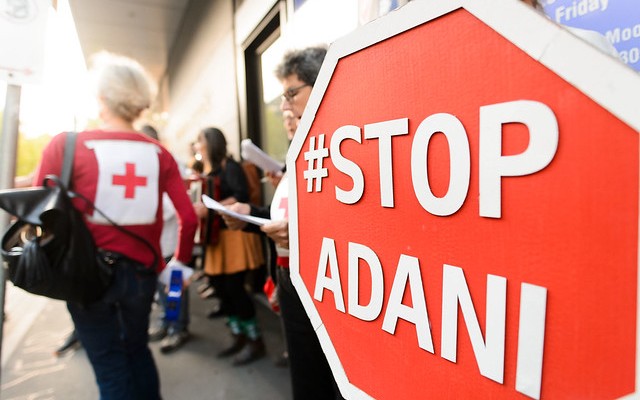‘Labor took a hugely ambitious agenda to this election …The prospect of raising big ideas and ambitious plans is just too dangerous. This formula is dead.’
The piece by the Age’s David Crowe exemplifies a certain mainstream reaction to the ALP’s shock loss.
One could, however, put forward a quite different argument.
Labor’s problems were, you might say, embodied in the form of Bill Shorten himself, a man who remained deeply disliked even as every poll put the ALP ahead of the Coalition.
Personal popularity waxes and wanes but the visceral disdain for Shorten mattered because of the sense that the man believed in nothing, that he’d say or do anything at all to win office.
Labor’s strategy did little to undercut the perception of its leader as an opportunist. On the contrary, a gulf between form and content ran through the entire campaign.
Shorten referred to a climate ‘emergency’ and pledged himself committed to ‘real action’. Yet Labor would not take a stand on Adani’s Carmichael mine, by far the most important single environmental issue in the country.
Even as Shorten attacked Morrison as a denier and dinosaur, the ALP put forward a plan to ‘unlock’ gas in the NT and Queensland, a scheme that would have, according to experts, unleashed even more emissions than Adani.
The ACTU transformed its ‘Change the Rules’ campaign into a long election rally for the ALP, hoping to replicate the labour movement’s success in getting Rudd in in 2007.
Yet Shorten consistently refused to spell out exactly which industrial rules he intended to change, an equivocation that blunted a union campaign already tarred by the outcomes of the Rudd/Gillard years (during which Labor put in place the IR architecture that would, under the Coalition, make Australia one of the most anti-union environments in the developed world).
Given that voters had long thought Shorten shifty, one could conclude that many people simply didn’t believe in Labor’s ‘hugely ambitious agenda’ – or, more exactly, didn’t believe that Labor believed in it.
But, irrespective of the accuracy of Crowe’s diagnosis, he’s probably correctly outlining the conclusions that Labor strategists will draw. There isn’t really a left in the ALP anymore – and the Labor right never needs an excuse to embrace a unity ticket with the Liberals.
But what does that mean?
A few weeks ago, the Intergovernmental Science-Policy Platform for Biodiversity and Ecosystem Services released its Global Assessment, a document written in collaboration by some five hundred scientists from over 50 countries. That report warned that a million species now face extinction, as the worldwide environmental crisis enters a new and dire phase.
‘If we are to halt the continued loss of nature,’ insisted Michelle Lim in the Conversation, ‘then the world’s legal, institutional and economic systems must be reformed entirely.’
Now, even the most sympathetic account of Shorten’s environmental platform in the 2019 election must acknowledge they did not amount to a reform on that scale; that, indeed, as Greenpeace put it, ‘the measures announced by Labor [were] not ambitious enough to combat the threat of catastrophic climate change’.
So if Crowe’s right, it’s not just ‘big ideas and ambitious plans’ that are dead to our politicians. It’s also, according to the best available science, a great chunk of life on Earth, with neither major party even trying to put forward the measures necessary to end extinctions.
That’s a bleak conclusion – but, in a way, it’s a bracing one since it clarifies, in the starkest possible fashion, the strategic perspectives in front of us.
The fight against climate change – and the broader environmental disaster of which it is part – depends on the construction of a social movement. It depends on the kind of struggle we associate with the civil rights campaigns of the sixties: on civil disobedience, on mass marches, on occupations, on ordinary people putting their bodies on the line to stop something we all know to be terribly wrong.
In Britain, we’ve already seen a faint glimpse of this via the actions organised by Extinction Rebellion over the past months. But we need more. Much, much more.
There’s no point underestimating the scale of the task.
Yet there are some reasons for optimism.
Throughout the campaign, Morrison studiously avoided putting forward any kind of program whatsoever. He might have won the election but no-one can claim popular enthusiasm for a Coalition platform, since the Liberals barely articulated policies at all.
If, as seems likely, the new government pushes ahead with Adani, one can imagine public opposition growing quite quickly, particularly since the (temporarily quelled) divisions between Liberal moderates and extremists remain unresolved.
Without the prospect of a Labor administration, the ACTU will be under pressure to rediscover Sally McManus’s early enthusiasm for breaking laws rather than changing them. And that might create space for the kind of union and community alliance we so obviously need.
In any case, what’s the alternative?
Again, matters could not be clearer. Either we fight – or we watch the planet die.
Read more perspectives on the 2019 Federal Election
Image: ‘Bill Shorten MP Action’ / Stop Adani






